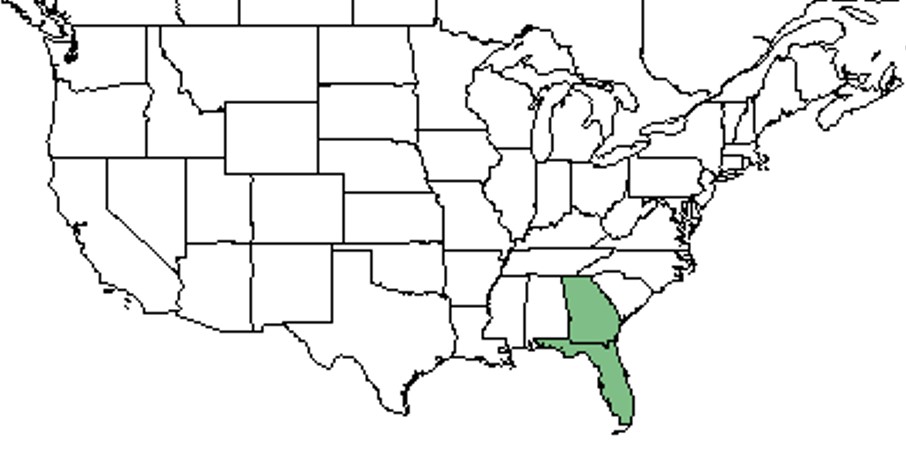Difference between revisions of "Liatris laevigata"
(→Taxonomic notes) |
|||
| Line 19: | Line 19: | ||
Common name: Shortleaf blazing star | Common name: Shortleaf blazing star | ||
| − | |||
| − | |||
==Taxonomic notes== | ==Taxonomic notes== | ||
| − | |||
Synonyms: ''Liatris tenuifolia'' Nuttall var. ''quadriflora'' Chapman; ''Laciniaria tenuifolia'' (Nuttall) Kuntze | Synonyms: ''Liatris tenuifolia'' Nuttall var. ''quadriflora'' Chapman; ''Laciniaria tenuifolia'' (Nuttall) Kuntze | ||
| Line 49: | Line 46: | ||
<!--===Use by animals===--> <!--Herbivory, granivory, insect hosting, etc.--> | <!--===Use by animals===--> <!--Herbivory, granivory, insect hosting, etc.--> | ||
<!--===Diseases and parasites===--> | <!--===Diseases and parasites===--> | ||
| − | + | ==Conservation and management== | |
| − | + | ==Cultivation and restoration== | |
==Photo Gallery== | ==Photo Gallery== | ||
<gallery widths=180px> | <gallery widths=180px> | ||
</gallery> | </gallery> | ||
| − | |||
==References and notes== | ==References and notes== | ||
Anderson, R. C. and E. S. Menges (1997). "Effects of Fire on Sandhill Herbs: Nutrients, Mycorrhizae, and Biomass Allocation." American Journal of Botany 84(7): 938-948 | Anderson, R. C. and E. S. Menges (1997). "Effects of Fire on Sandhill Herbs: Nutrients, Mycorrhizae, and Biomass Allocation." American Journal of Botany 84(7): 938-948 | ||
Revision as of 12:51, 24 June 2016
| Liatris laevigata | |
|---|---|

| |
| Scientific classification | |
| Kingdom: | Plantae |
| Division: | Magnoliophyta - Flowering plants |
| Class: | Magnoliopsida – Dicotyledons |
| Order: | Asterales |
| Family: | Asteraceae ⁄ Compositae |
| Genus: | Liatris |
| Species: | L. laevigata |
| Binomial name | |
| Liatris laevigata (Nutt.) Small | |

| |
| Natural range of Liatris laevigata from USDA NRCS Plants Database. | |
Common name: Shortleaf blazing star
Contents
Taxonomic notes
Synonyms: Liatris tenuifolia Nuttall var. quadriflora Chapman; Laciniaria tenuifolia (Nuttall) Kuntze
Sometimes L. laevigata is classified as a variety of L. tenuifolia, however, they have distinct characteristics. L. laevigata can be distinguishable from L. tenuifolia by having wider and coarser leaves[1].
Description
A description of Liatris laevigata is provided in The Flora of North America.
L. laevigata is a perennial species that consist of a globose corm, glabrous stem, basal and proximal cauline leaves[2]. The inflorescence consists of a scape with reduced leaves and many purple flower heads (Herndon 1987).
Distribution
Restricted to peninsular Florida and adjacent Georgia [2].
Ecology
Habitat
Habitats are well-drained sandy soils such as longleaf pine-saw palmetto flats; ecotones between longleaf pine turkey oak sand ridges and pine flatwoods; scrub oak-wiregrass ridges; Pinus clausa/Ceratiola scrubs; Quercus laurifolia hammocks; and pine flatwoods on limerock. It has occurred in disturbed areas such as roadsides, sandy fallow fields, and bulldozed clearings of pine flatwoods. Associated species include Liatris pauciflora, Aristida, Sorghastrum, Carphephorus corymbosus, Pinus clausa, Serenoa repens, Carya florida, Quercus myrtifolia, Quercus geminata, Osmanthus megacarpus, Prunus geniculata, Bumelia, Ceranthera, Polygonella, and Penstemon (FSU Herbarium).
Phenology
Flowers and fruits August through December (FSU Herbarium). Herndon (1987) observed that all of the flowers will produce seeds as long as they were not degraded by herbivores or pathogens.
Fire ecology
It has been observed to have a strong fire-dependent blooming behavior, blooming in large numbers in pinelands that have been burned recently, and rarely blooming or not at all in pinelands that have been unburned for more than two years (Herndon 1987). Anderson and Menges (1997) found that L. tenuifolia var. laevigata responded quickly and strongly to burning and blooms at high rates in the year following a fire. This study also found that concentrations of Nitrogen, Phosphorous, Potassium, and Iron were 2 to 6 fold higher in individuals in burned areas compared to those in unburned areas. The root length of individuals is also longer in burned sites.
Conservation and management
Cultivation and restoration
Photo Gallery
References and notes
Anderson, R. C. and E. S. Menges (1997). "Effects of Fire on Sandhill Herbs: Nutrients, Mycorrhizae, and Biomass Allocation." American Journal of Botany 84(7): 938-948
Florida State University Robert K. Godfrey Herbarium database. URL: http://herbarium.bio.fsu.edu. Last accessed: October 2015. Collectors: Loran C. Anderson, Jane Brockmann, W.C. Brumbach, Richard Carter, Steven P. Christman, Andre F. Clewell, George R. Cooley, David K. Dorman, Richard J. Eaton, J. Ferborgh, Robert K. Godfrey, S.C. Hood, Beverly Judd, Walter S. Judd, Gary R. Knight, Robert Kral, Olga Lakela, S.W. Leonard, Tin Myint, Jackie Patman, R.E. Perdue Jr., Kent D. Perkins, James D. Ray Jr., D.B. Ward. States and Counties: Florida: Brevard, Citrus, Collier, Dade, Duval, Hardee, Hernando, Highlands, Hillsborough, Jackson, Lake, Lee, Levy, Marion, Monroe, Nassau, Osceola, Pinellas, Polk, Putnam, St. Johns, Suwannee, Taylor. Compiled by Tall Timbers Research Station and Land Conservancy.
Herndon, A. (1987). "Variation in Resource Allocation and Reproductive Effort within a Single Population of Liatris laevigata Nuttall (Asteraceae)." American Midland Naturalist 118(2): 406-413.